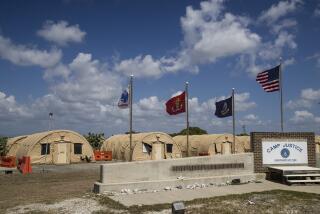Tortured logic
‘THE UNITED STATES DOES NOT TORTURE,” President Bush said last week. It can, however, make use of what he euphemistically called “an alternative set of procedures” for eliciting information from prisoners suspected of being terrorists.
The difference between torture and these “alternative procedures” seems to be who’s conducting the interrogation and where it takes place. If it’s the CIA and it’s overseas, they’re permissible alternative procedures. Anywhere else, they’re not allowed. This kind of legalistic legerdemain doesn’t just expose the weakness of the administration’s argument, it does a real disservice to U.S. foreign policy and all those serving overseas.
The administration characteristically refused to provide details about its methods. But experts on interrogation suspect that these alternative procedures could include subjecting prisoners to extreme temperatures and “waterboarding,” in which a prisoner is strapped to a board and put in fear of drowning if he doesn’t confess.
Such techniques seem to qualify as “humiliating and degrading treatment” prohibited by Common Article 3 of the Geneva Convention, which protects so-called enemy combatants, at least according to the Supreme Court. That’s also the military’s view. The new Army field manual, rooted in Article 3, prohibits extreme interrogation tactics such as waterboarding and conducting mock executions.
The administration, apparently untroubled by this disagreement, is now asking Congress to declare that detainees who claim violations of the Geneva Convention may not have their day in court. The administration also wants to amend the 1996 War Crimes Act, which makes violation of the Geneva Convention illegal under U.S. law. New language would allow for prosecution only for “torture” and “cruel and inhumane treatment,” not for “humiliating and degrading treatment.” A 2005 law already allows interrogators accused of abuse to offer the defense that they “did not know that the practices were unlawful and [that] a person of ordinary sense and understanding would not know the practices were unlawful.” That’s protection enough.
Even the clearest legal language is subject to differing interpretations. But the Bush administration has a record of taking the narrowest possible view of protections for detainees under U.S. and international law. Indeed, until the Supreme Court forced it to change course, the administration argued that unlawful enemy combatants in the war on terror weren’t covered by the Geneva Convention at all.
Given an inch by the law, this administration too often has taken a mile — creating a climate in which lower-level service members could feel that they were justified in the sort of abuse that took place at Abu Ghraib. As Congress moves to write legislation governing the treatment of present and future detainees, it needs to keep that history in mind and force the president to spell out what he means by alternative methods. And Congress should allow detainees who claim those methods violate their rights under the Geneva Convention to have their day in court.
More to Read
Sign up for Essential California
The most important California stories and recommendations in your inbox every morning.
You may occasionally receive promotional content from the Los Angeles Times.










